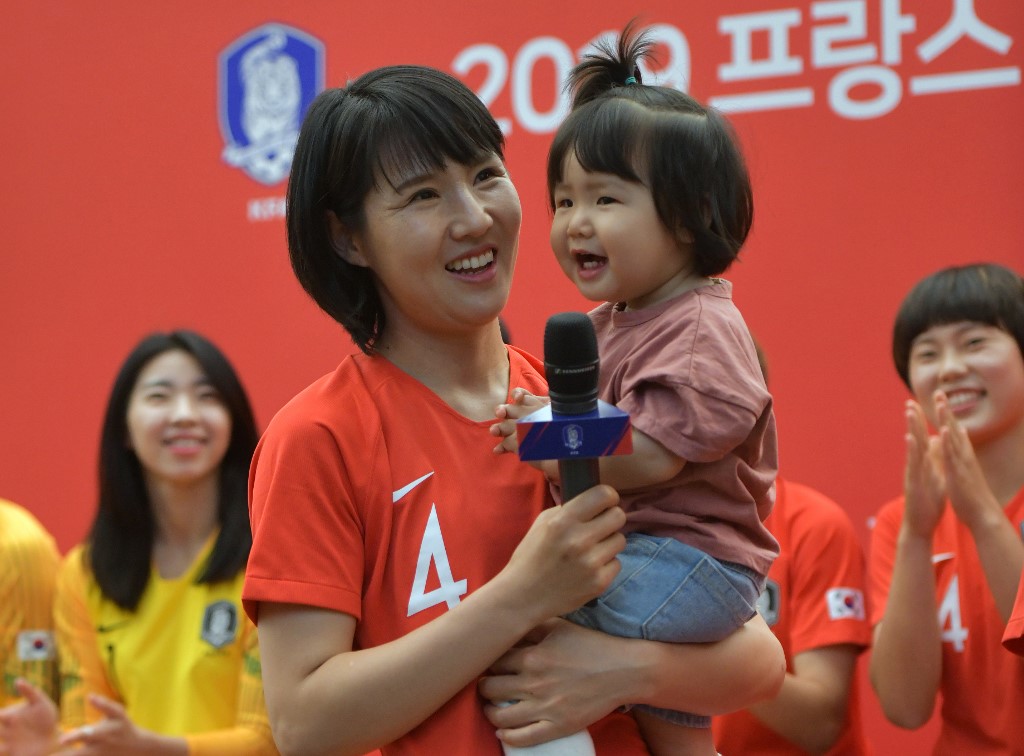‘Tough journey’: South Korean mother blazing trail at World Cup

This picture taken in Seoul on May 20, 2019 shows South Korean women’s football team player Hwang Bo-ram (C) holding her daughter Lee Bom as her teammates look on during a launching ceremony of South Korean squad for the upcoming FIFA Women’s World Cup. – When defender Hwang Bo-ram takes to the field in France next month, she will become the first mother to play for South Korea at the FIFA Women’s World Cup. (Photo by Jung Yeon-je / AFP) / TO GO WITH AFP STORY fbl-WC-2019-women-KOR-gender-SKorea / PROFILE BY Claire LEE
When defender Hwang Bo-ram takes to the field in France next month, she will become the first mother to play for South Korea at the Women’s World Cup, challenging traditional notions of motherhood in her homeland.
In a country where the gender pay gap remains high, and marriage and child-rearing can cripple a woman’s career, Hwang is the only wedded woman in the squad and its oldest member at 31.
It will not be the first time her personal life has made World Cup headlines: husband Lee Du-hee popped the question on the pitch after South Korea drew with Costa Rica in Montreal at the last edition in 2015.
Their daughter Bom was born 14 months ago.
Few expected Hwang to return to the WK League, South Korea’s top-tier women’s football competition, where only one mother — now retired — had played before.
But after her club Hwacheon KSPO restored her to the side in December, she made her national team comeback in April and this month she was named in the World Cup squad.
“Training has been very hard” since having a child, Hwang said before leaving for pre-tournament camp in Sweden, “because I have to set a good example”.
“I didn’t want to hear people say ‘She’s had a baby”, or ‘She’s too old to play now’,” she told reporters.
“So I made no excuses, hid my emotions and trained harder.”
Economy class
South Korea is Asia’s fourth biggest economy and a regional sporting power, one of only two Asian countries — alongside Japan — to have hosted both summer and winter Olympics.
But it remains hierarchical and patriarchal in many respects, including its job market, where 82 percent of married men are employed compared with only 53 percent of married women.
Mothers and married women often face discrimination, with many companies reluctant to employ them, doubting their commitment and fearing they will not put in the long hours that are standard for South Korean workers.
The country’s gender pay gap is the highest among developed economies, with working women only making 63 percent of what men earn.
Football is no exception.
Kim Shin-wook, the best-paid player in the men’s K League 1, earned 1.6 billion won (US$1.4 million) last year.
But the upper salary limit for women players in the WK League was just three percent of that, at 50 million won.
In 2015, the Korea Football Association faced public criticism for providing members of the men’s national team with business-class air tickets, while women players got economy.
The KFA reportedly said that “male players bring much more money to the association”.
“The significance of Hwang being the first mother to compete in the World Cup isn’t just limited to South Korea’s football history,” said Choi Dong-ho, director of the Center for Sports Culture research group.
“This is such a meaningful achievement for South Korean society as a whole, where many women struggle to return to or find work after having children,” he said.
–Your body isn’t the same’
On her doctor’s advice Hwang did not play football during her pregnancy. Five months after giving birth she started with weights and pilates, and began training with a high school soccer team three months later.
It had been a “very tough journey” for Hwang, said her husband Lee.
“As a professional athlete, not having played the sport for almost two years is a huge challenge even for those who did not go through pregnancy and childbirth,” he told AFP.
“She was under a lot of pressure because obviously your body isn’t the same when you have a baby. She wasn’t sure — while doing her very best — if she would be able to play football the way she did pre-baby.”
But Hwacheon KSPO’s head coach Kang Jae-soon — who has known Hwang for about 20 years — said he wasn’t surprised she had made it back into the national team.
“She’s got the speed, strength and determination like no other. And now she is also one of the most experienced players in the league.”
Hwang’s husband takes care of their daughter while his wife trains away from home, and will do so for the World Cup.
“I burst into tears when I first heard that Bo-ram made to the national team,” he said.
“I knew how hard she worked despite all the challenges. I can’t describe how much respect I have for my wife.”